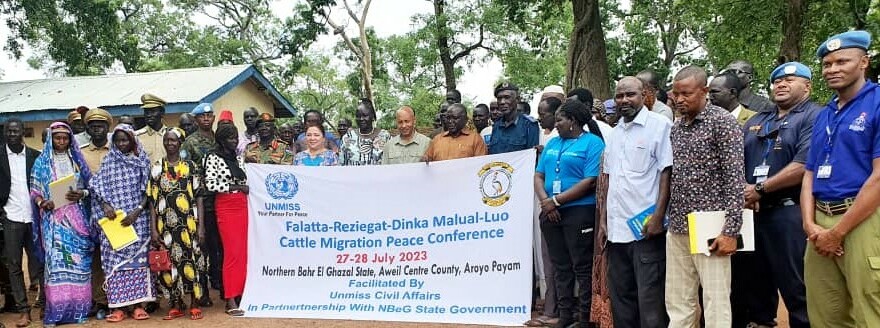In an effort to address the recent outbreak that resulted in the deaths of over 5,000 cattle since April, delegates from four communities – Lou, Fallata, Rizeigat, and Dinka Malual – have gathered for a two-day peace conference in Aweil Center County, Northern Bahr el Ghazal State.
The dispute arose when some groups accused the Fallata community, and vice versa, of being responsible for the disease’s genesis. In response to the escalating tensions, the state government collaborated with a non-governmental organization to conduct a thorough survey on the incident and bring the communities together for dialogue.
Following the conclusion of the conference, the survey results were released on Friday.
Albino Ujieth, a member of the Luo community, spoke to Radio Tamazuj from Aroyo, Aweil Center County, stating, “What happened was that more than 5,000 cattle have died since April in Aweil Center County, and that caused misunderstanding among Lou, Dinka Malual, Fallata, and Riziegat communities. Each group accuses the other.”
Paramount Chief Mohammed Omer Adam of the Fallata community downplayed the severity of the case, dismissing it as a minor issue that has been blown out of proportion by baseless accusations and propaganda. He emphasized the importance of investigating the true reasons behind the livestock deaths to promote peace among the communities.
“This is a small case, but there are a lot of accusations and propaganda and there is no one to confirm what is true. As the tribal leaders who are attending the conference, I wish we must investigate what were the reasons behind the deaths of cattle and then come up with a conclusion because we don’t want chaos among ourselves,” said Omer.
Chief Omer also acknowledged their community’s failure to secure necessary veterinary vaccines, which contributed to the unfortunate demise of thousands of animals.
Abuor Gordon Nhial, the state’s minister of peace-building, clarified that the conference’s main agenda was to address the April infections in animals and prevent further finger-pointing between communities. She urged all parties involved to maintain peaceful relations and assured them that the animal health department would soon announce the exact cause of the disease outbreak.
“The agenda is connected with the outbreak that claimed the lives of thousands of animals in April, and the result was not identified. The community in the area, which lost their cows, blamed the Fallata members for contaminating green pastures and grazing lands with quantities of powdered materials,” stated Minister Gordon. She added that outsiders were brought in to investigate the matter objectively, emphasizing the importance of coexistence among the Fallata, Dinka, Luo, and Rizeigat communities.
The peace talks were initiated by the government and financially supported by the United Nations Mission in South Sudan (UNMISS). The hope is that through dialogue and understanding, the communities can reach a resolution and foster peaceful cohabitation in the region.




